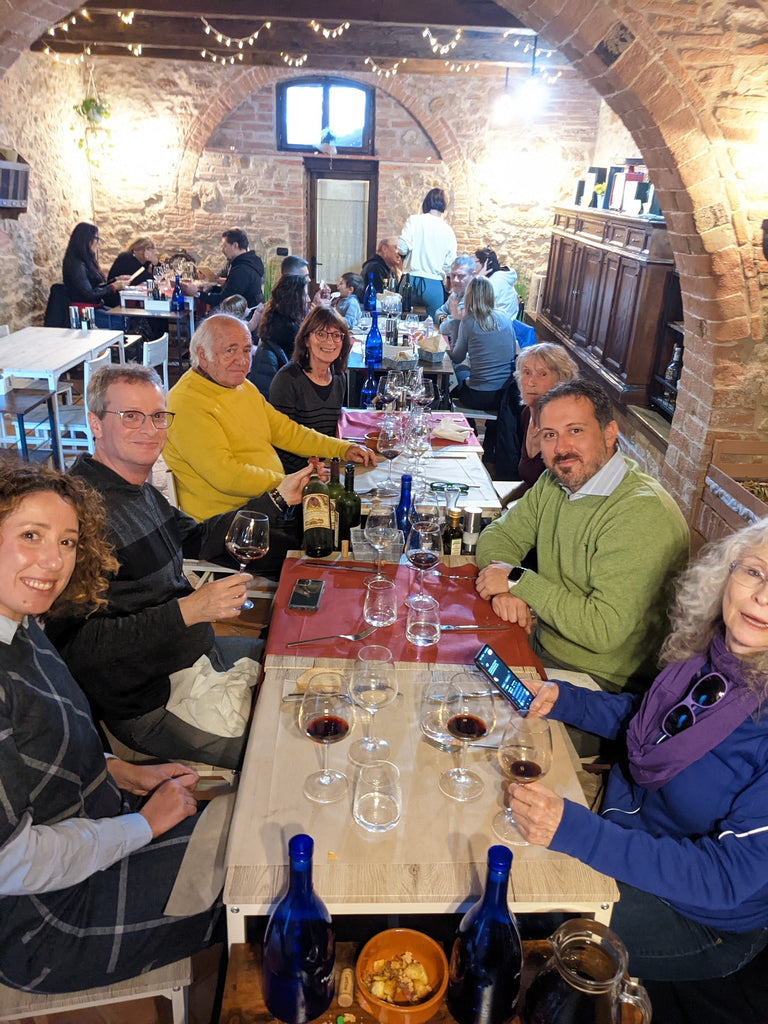Our tasting impressions
Innocenti's Occhio di Pernice is the nectar of the gods. The 1999 reminds us of the incredible 1997. So redolent of fig and honey with impeccable balance. It's not overly sweet. Its splendor is in its haunting depth. It’s riveting and transporting. This is a truly special wine and there is precious little available.
About this wine
Occhio di Pernice translates to eye of the partridge, so named because it is darker in color than the more common Vin Santo. Innocenti's version of this incredibly rare, sweet wine is 100% Sangiovese.
The grapes come from low density vineyards planted on average, 40 years ago in Montefollonico, which neighbors Montepulciano. They are handpicked and collected in small crates. Only the best grapes that are ripe and have tough skins from sparse clusters are selected. They dry naturally in the crates for about 5 months and then, are pressed. The must obtained from this process - the Madre (mother yeast) -is fermented in small, 50-75L barrels called Caratelli. Innocenti uses chestnut.
The mother (yeast) has been used for generations and provides the unmistakable taste of Vin Santo. Significant evaporation occurs during the many years the wine is in the barrel. By regulation, the final product must not be more than 30% of the original volume of grapes. Technically, this is an oxidative wine because of the protracted maceration and aging.
About the grape
Sangiovese is the most planted grape in Italy and is the dominant grape throughout the central part of the country. There are many variants and even different names like Prugnolo Gentile, Brunello, Sangioveto and Morellino.
The grapes are dark and thick skinned, slow-ripening, acidic and tannic. Like Pinot Noir, Sangiovese is heavily influenced by its terroir and similarly can be quite transparent in its differences from place to place.
Traditionally, Sangiovese-based wines (except in Montalcino) have other grapes mixed in, but in recent history there have been many successful wines produced from 100% Sangiovese. So, today, they are quite common.
On your table
Drink on its own after dinner or with a simple dessert. A traditional accompaniment is cantuccini - a type of biscotti with almonds. Vittorio remembers in his youth, people drinking it with a creamy custard, either pudding or cake (not too sweet, like a typical Italian dessert). Once opened, the wine should stay fresh for about 1 month.
Vittorio Innocenti, a former philosophy teacher, started producing wine from his family's vineyards with the 1978 vintage from his 13th century cellar in Montefollonico. There are 32 hectares of vines in Montepulciano and Montefollonico but only 12 are planted with vineyards of up to 80 years old. The vista views from the back patio are incredible.
Today, Vittorio's son Tommaso and his partner Vincenza (aka Nancy) handle most of the work. But Vittorio is the keeper of the intellectual capital for all seven wines - in particular both versions of Vin Santo. In total, they produce about 35,000 bottles annually.
The Innocentis are a gracious, wonderful family. The Guru has known them longer than any other wine producer. He admires their intense commitment to producing the highest quality wines - taking as much pride in their most modest offering as they do in their top bottling.
VDLT is the only North American source for these extraordinary wines that are released much later than most top estates in the appellation. The Vino Nobile, Riserva and Acerone are capable of long and magnificent aging. In the photo to the right, we enjoyed a 1985, 1988 and 1993 at a recent lunch. Their freshness and vibrancy belied their ages.
